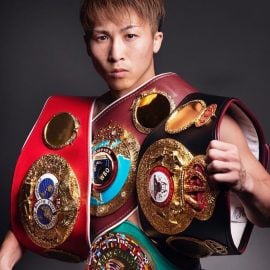10: Notable Olympic boxing controversies
2. September 22, 1988 – Alexander Hristov (Bulgaria) W 3 Byun Jong Il (South Korea)
The boxing competition in Seoul was marred by frequent outrages, and this bantamweight second-round bout between Hristov and Byun was the most violent of all.
Hristov-Byun was an ugly fight style-wise, for the Bulgarian’s stand-up fast-twitch jab-and-move tactics were diametrically opposed to Byun’s raging southpaw lunges. Because the shorter Byun ducked his head while charging in, New Zealand referee Keith Walker deducted points in rounds one and two. South Korean team trainer Lee Heung Soo jumped onto the ring apron upon seeing the second point deduction, a move that normally would have disqualified his fighter. But Walker, knowing such a move would have caused an already volatile situation to explode, refrained and allowed the fight to continue.
 Byun landed the harder punches in rounds two and three while the octopus-like Hristov did his best to neutralize the South Korean’s charges and prevent him from further scoring. It was terrible to watch and both men were warned for various infractions that resembled Greco-Roman wrestling more than the Sweet Science.
Byun landed the harder punches in rounds two and three while the octopus-like Hristov did his best to neutralize the South Korean’s charges and prevent him from further scoring. It was terrible to watch and both men were warned for various infractions that resembled Greco-Roman wrestling more than the Sweet Science.
According to NBC’s Count-a-Punch, Byun out-landed Hristov 15-6 in round two, 17-12 in round three and 42-32 overall but Walker’s point deductions effectively sealed Hristov’s 4-1 decision victory. With a highly-charged partisan audience howling in protest, those at ringside took matters into their own hands.
Trainer Lee led a posse of angry South Koreans that charged directly at Walker, who they actually thought was Greek referee Theodoras Vidalis, who the team accused of saying “we’ll get the Korean again next time” when they objected to Oh Kwang Soo’s 3-2 loss to Michael Carbajal. One of the men who charged the ring was security man S.L. Yoon, who whipped off his yellow jacket and landed two punches on the cowering Walker. Despite his slender build, Argentine referee Osvaldo Bisbal placed himself between Walker and the swarm and did his best to fend them off.
According to Sports Illustrated’s Pat Putnam, another security official ripped the scoring sheets from the hands of Emil Zhechev, the president of AIBA’s referee committee who also was Hristov’s countryman, then tried to beat Zhechev over the head with a Ping-Pong ball container used to randomly select officials for bouts. U.S. boxing judge Stan Hamilton blocked the blow and suffered a cut hand for his trouble.
As Walker left the ring, yet another security official unleashed a taekwondo kick toward the referee’s head, intentionally missing the referee but smashing a nearby pipe.
The message was delivered and Walker unmistakably received it. The New Zealander gathered his belongings, went to Kimpo Airport and took the first place out of the country. Byun, for his part, stayed right where he was, engaging in what would be a 67-minute sit-in inside Ring B while the remaining bouts from the morning session continued.
If the Hristov-Byun fiasco had been the only source of shame for the boxing organizers that would have been more than enough to affix the scarlet letter on the boxing competition. The Hristov-Carbajal decision would have further emblazoned that letter. But as those who know the sport well realize that another fight, one that unfolded 10 days after Hristov-Byun, would end up taking center stage.















